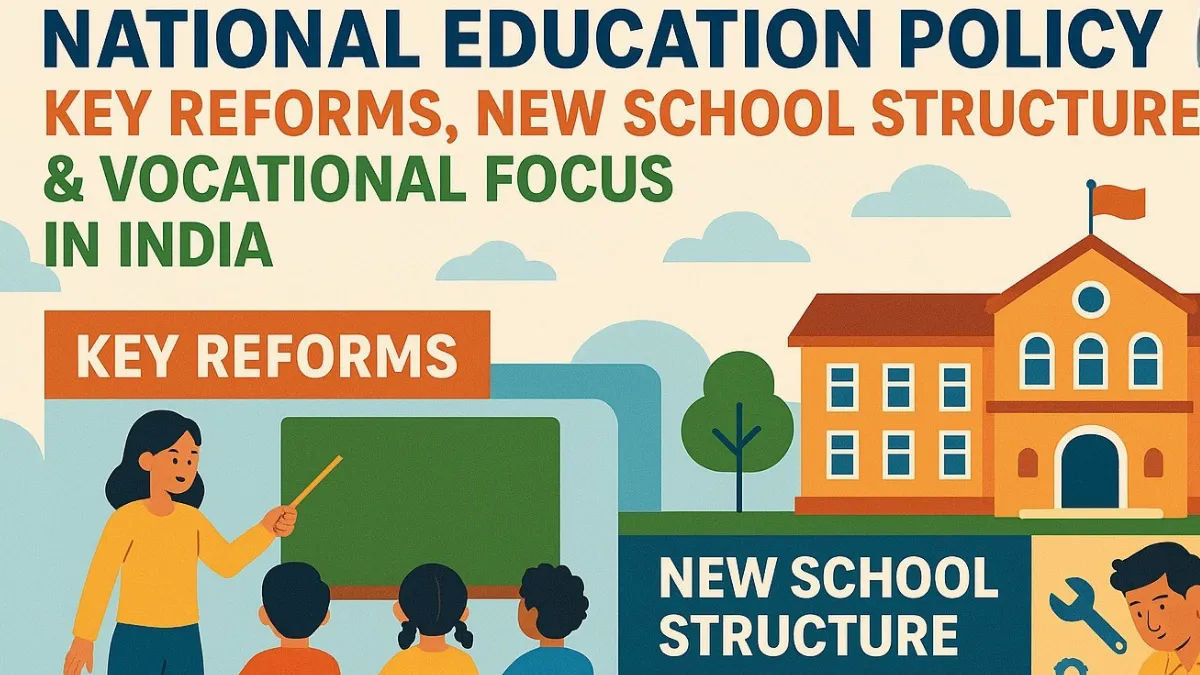The National Education Policy 2025 (NEP 2025) marks a transformative step forward in India’s educational landscape. Building upon the foundational goals set by NEP 2020, the 2025 policy integrates deeper structural reforms, emphasizes skill development from an early age, and leverages cutting-edge digital technologies to modernize the learning experience. It signals a future-ready approach that aligns education with real-world needs while addressing long-standing challenges in equity, accessibility, and relevance.
A Shift in School Structure – 5+3+3+4 in Focus
National Education Policy 2025 (NEP 2025) reinforces the 5+3+3+4 curricular structure introduced in NEP 2020. This model restructures the traditional 10+2 pattern into four stages:
- Foundational Stage (3–8 years) – Includes preschool to Grade 2
- Preparatory Stage (8–11 years) – Grades 3 to 5
- Middle Stage (11–14 years) – Grades 6 to 8
- Secondary Stage (14–18 years) – Grades 9 to 12
The foundational and preparatory stages now incorporate Early Childhood Care and Education (ECCE), bringing Anganwadi centers and Balvatika classrooms into the mainstream. This structure emphasizes play-based, discovery-oriented learning in the early years and gradually introduces abstract concepts in later grades.
Importantly, automatic promotion is being phased out. Students in Grades 5 and 8 will now need to pass competency-based evaluations to progress, making assessments more meaningful and aligned with actual learning outcomes.
Vocational Education from Grade 6 – Learning Real-World Skills
A standout reform in NEP 2025 is the mainstreaming of vocational education. By 2025, 50% of students are expected to receive exposure to skill-based training starting from Grade 6.
Students will engage in hands-on training in areas like:
- Agriculture
- Carpentry
- Coding
- Electronics
- Design
- Green energy
- Financial literacy
The policy encourages partnerships with local industries for apprenticeships and internships. This ensures that students graduate with both academic knowledge and practical job-ready skills, bridging the gap between education and employment.
Digital Learning Revolution – Smart Classrooms & AI Integration
NEP 2025 amplifies the digitalization of education. Key reforms include:
- Deployment of smart blackboards in government schools
- Integration of AI-powered adaptive learning platforms
- Expansion of DIKSHA, the digital content platform
- Promotion of virtual labs, especially for science and computer-based learning
- Upgradation of ICT infrastructure in rural areas via BharatNet
The aim is to reduce the digital divide and ensure that every child, regardless of location, has access to quality digital content and interactive learning experiences.
Assessment Reforms – Competency Over Cramming
To address the pressure of rote-based learning and high-stakes exams, NEP 2025 introduces competency-based assessments across all grades. The newly formed PARAKH agency (Performance Assessment, Review, and Analysis of Knowledge for Holistic Development) will:
- Set uniform standards for assessments
- Promote regular, low-stress, formative evaluations
- Encourage creativity, critical thinking, and application of concepts
Board exams will now be conducted twice a year, with the best score retained. This gives students multiple chances and lowers anxiety. The format will focus more on conceptual and analytical questions than on memorization.
Higher Education – Flexibility and Multidisciplinary Approach
In higher education, NEP 2025 builds on the Academic Bank of Credits (ABC), allowing students to exit and re-enter courses with recognized credits. A student can complete a diploma, degree, or advanced qualification at their own pace.
Other key higher education reforms:
- Introduction of CUET (Common University Entrance Test) across universities
- Permission for foreign universities to set up campuses in India
- Promotion of multidisciplinary education – e.g., students can combine Physics with Music or Computer Science with Linguistics
- Emphasis on research and innovation at the undergraduate level
These reforms aim to make Indian universities globally competitive and accessible to a diverse student base.
Language and Multilingualism
Language learning takes center stage, with instructions recommended in mother tongue or regional languages till at least Grade 8. Competitive and board exams like JEE and NEET will also be offered in multiple languages.
Students are required to learn at least two languages, one of which must be an Indian language. This policy preserves cultural identity while improving communication skills in a multilingual society.
Teacher Training and Governance
Teachers are the foundation of any education system. NEP 2025 mandates:
- 80% of teachers to be trained in digital and pedagogical innovations by 2025
- A 4-year integrated B.Ed. program as the standard
- Continuous professional development through online platforms
- Transparent and merit-based recruitment of educators
Improved school leadership, school-based management, and decentralized decision-making are being encouraged at the grassroots level.
Equity, Access, and Inclusion
NEP 2025 strengthens inclusion with:
- Gender Inclusion Fund
- Special Education Zones for underserved regions
- Enhanced access to libraries, midday meals, and transport support for rural students
- Support for differently-abled learners through tailored resources and training
The policy targets universal enrollment by 2030, ensuring no child is left behind.
Conclusion: NEP 2025 – Building Future-Ready Learners
NEP 2025 is more than a policy; it’s a vision for India’s future. By focusing on skills, flexibility, digital integration, and inclusive education, it promises to unlock the full potential of every learner. With effective implementation and collaboration among states, educators, and communities, India can become a global leader in education that’s holistic, equitable, and future-proof.








